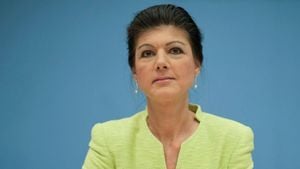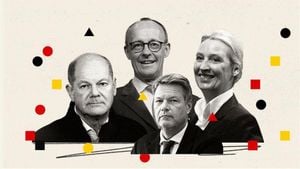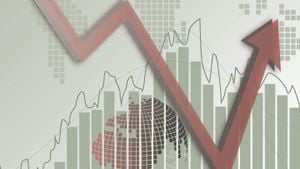Germany witnessed significant shifts during the 2025 Bundestagswahl held on November 6, with results indicating the Union, led by Friedrich Merz, as the clear winner, capitalizing on voter dissatisfaction with the coalition government consisting of the SPD, Greens, and FDP, known as the Ampel government. The election projections indicated the Union securing 28.9 percent of the votes, marking a notable increase of 4.8 percentage points compared to the last election, and placing them firmly at the forefront of the new Bundestag.
After the election, Jan Nolte, the AfD's Spitzenkandidat, celebrated, stating, "Wir haben uns verdoppelt," as his party surged to 19.9 percent, almost doubling its previous result, fueled by public concerns over immigration and rising costs of living. On the contrary, the SPD faced significant losses, plunging to just 16.2 percent, constituting the worst result in their history. Chancellor Olaf Scholz referred to the results as, "Das ist ein bitteres Wahlergebnis für die sozialdemokratische Partei, das ist auch eine Wahlniederlage," emphasizing the party's failure to connect with voters.
The election saw record voter turnout at approximately 84 percent, drawing clear indications of the public’s dissatisfaction with the current administration. Many voters cited economic instability, high living costs, and migration as primary concerns influencing their choices. CDU’s campaign effectively shifted focus to economic policies coupled with stringent migration proposals. Merz’s ability to offer itself as the alternative to the criticized Ampel coalition was pivotal.
The Greens managed to gather 13 percent of the votes, albeit slightly below their previous result of 14.7 percent, attributed to the party’s positioning associated with the Ampel coalition’s failures. The Left Party celebrated their return to parliament with 8.5 percent, led by Heidi Reichinnek, who excitedly announced, "Ich bin so unfassbar glücklich über unser Ergebnis," acknowledging the party's renewed focus on social justice had appealed to voters.
On the other hand, the FDP remained just below the five percent line with 4.9 percent, indicating more struggles and uncertainty for the party. Meanwhile, the newly formed Bündnis Sahra Wagenknecht (BSW) garnered only 4.8 percent, putting them at risk of not entering the Bundestag, reflecting the party's regression following earlier successes.
The elections underscored the populace’s desire for political change with Boris Rhein from the CDU affirming there’s now, "einen klaren Regierungsauftrag" for the Union, urging them to form the next government. The prevailing narrative suggests voters felt punished by the Ampel coalition’s performance over issues like immigration, public security, and economic management.
Political analysts comment on the remarkable shift of power, where dissatisfied voters sought refuge with parties focused on stricter immigration policies like AfD, igniting discussions on potential coalitions moving forward. The Union is now considering potential alliances, with speculation hinting at opportunities for negotiations with both the SPD and the AfD, capturing the urgency for stable governance amid societal unrest.
Public sentiment appears to align more closely with the Union’s policies under Merz, who has indicated readiness to lead the country toward addressing pressing economic challenges and security matters, with coalition discussions anticipated to commence shortly. The upcoming governmental formation will be pivotal as Germany navigates through these tumultuous times, raising questions about how new dynamics will shape the country’s future governance.



